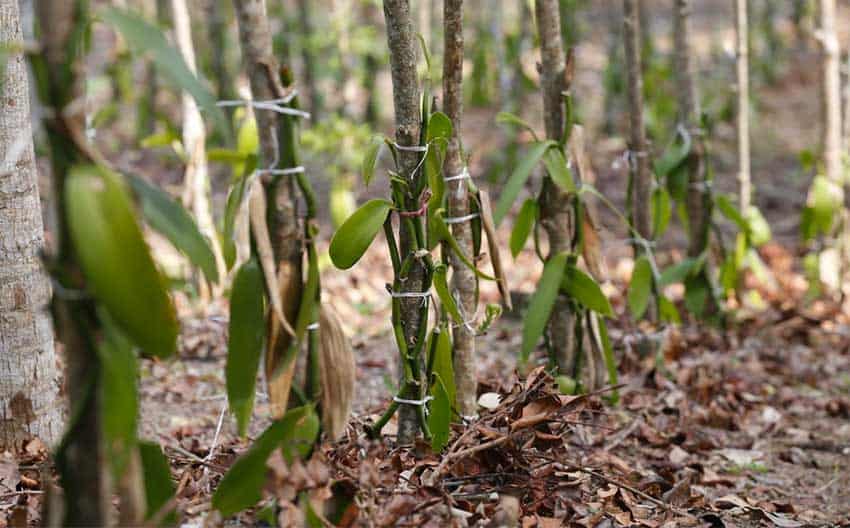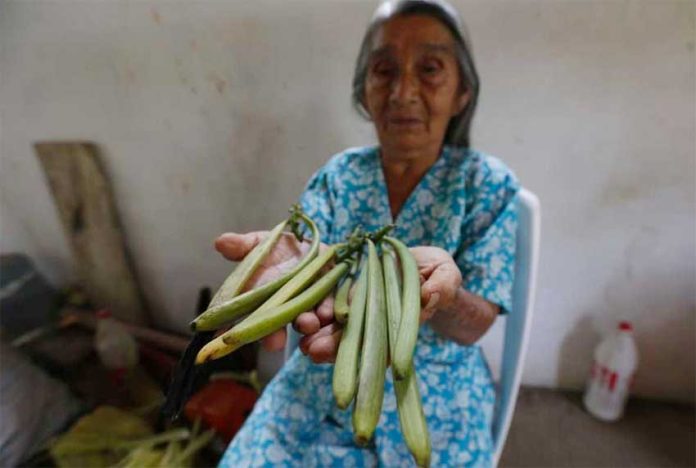Vanilla is the world’s second most expensive spice after saffron and one of 16 Mexican products that enjoy denomination of origin protection, but its long-term survival in Mexico is at risk.
The product is increasingly being targeted by thieves, driving growers to abandon the crop and grow something else.
Vanilla orchids are grown in several Mexican states including Chiapas, Oaxaca and San Luis Potosí but the epicenter of production is Veracruz and in particular Papantla, a city that has been known as “the vanilla capital” and which once upon a time was dubbed “the city that perfumes the world.”
But the heyday of vanilla production in Papantla and the wider Totonacapan region in the north of Veracruz is over, according to Óscar Ramírez, a vanilla farmer and president of a growers’ association.
“. . . They’re just memories,” he said, referring to Papantla’s erstwhile nicknames. “Vanilla [in Mexico] is sadly in danger of extinction.”
A kilogram of vanilla can yield prices as high as US $700, making the crop an attractive target for thieves for whom there is little deterrent against committing the crime.
In Papantla, a decades-old municipal decree establishes a fine of just 20 pesos (US $1) for stealing it, a penalty Ramírez described as “ridiculous.”
“The law has to be updated,” he said, adding that new, specific laws that set harsher penalties for vanilla theft should be adopted nationwide.
In recent years, a huge number of vanilla growers in the north of Veracruz have given up on cultivating the plant after seeing their hard work come to nothing as a result of theft.
It takes three years on average for producers to get to the stage when the pods on their vanilla orchids are ready for harvest, whereas thieves can profit much more quickly.
“Just imagine, years of work is stolen in minutes,” said Juan Salazar, a vanilla grower in El Ojital, a community near Papantla.

The farmer said that vanilla theft usually occurs in October and November just before the harvest, explaining that higher prices for “gourmet” vanilla in recent years – the per-kilo price has tripled – have only encouraged would-be thieves.
Salazar, who grows vanilla on a three-hectare property for customers that include tequila and perfume makers, said that growers last year were forced to take drastic measures to protect their crops.
“To guarantee that they would be able to harvest what they worked for the entire year, they [the growers] stayed at their plots, they made fires and they slept 10 meters away because those who cut [the plants] enter in the early morning,” he said.
“A lot of farmers carry machetes but if a thief has a gun, one puts his life on the line,” Salazar added, explaining that there have been cases in which growers have been killed while defending their plants.
While many producers have decided to get out of the vanilla-growing business altogether, others agree to sell their yield to opportunistic buyers who prey on their fear, Salazar explained.
“They come to purchase the vanilla early, before it completes its nine months of ripening. They pay low prices and the producer sometimes prefers to sell . . . so that their crops aren’t stolen,” he said.
The grower explained that the prices the coyotes pay are sometimes less than half the product’s real value but added that farmers prefer to get “a few pesos” than nothing at all.
In light of the increasing number of thefts, vanilla growers have appealed to authorities to bolster security in the north of the state to protect their industry as well as others, such as tourism.
“Vanilla has to be protected, it’s in danger of extinction and like any other species or animal that is in danger of extinction and for which laws are to protect them, the same must urgently be done with vanilla,” said Ramírez, the growers’ association president.
In addition to theft, climate change, the loss of tropical forests and cheap synthetically-made vanilla imitations also represent a threat to Mexico’s vanilla industry.
While the problems faced by Mexican vanilla and those who continue a tradition of cultivation that dates back to pre-Hispanic times are serious, Ramírez said the situation is not all doom and gloom.
“What nobody has taken away yet is the denomination of origin – Papantla vanilla, the best quality in the world.”
Source: Milenio (sp)
